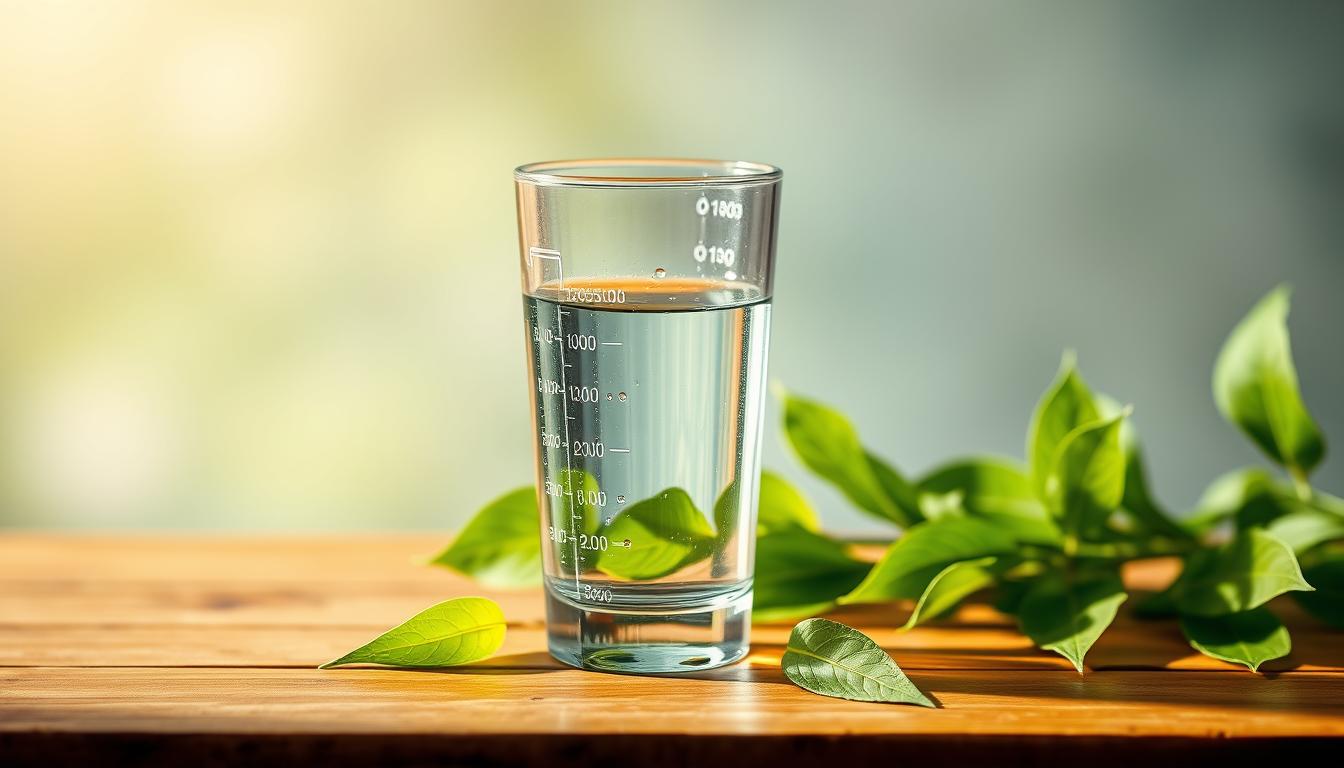Table of Contents
How much water should you drink a day ?
Drinking enough water is crucial for health, but knowing how much is tricky. Experts say eight glasses a day, but it’s not the same for everyone. This article looks into the science and what affects your needs.

Drinking water boosts energy and focus. But, fixed amounts don’t account for body size, exercise, or climate. This guide clears up myths and offers tips for your lifestyle.
Key Takeaways
- Hydration needs differ based on activity level and body size.
- Thirst isn’t always the best indicator of water requirements.
- Water supports organ function and regulates body temperature.
- Coffee and tea can contribute to daily intake, but water remains optimal.
- Overhydration is rare but possible—balance is essential.
Understanding Daily Water Intake
Knowing how much water you need keeps your body in balance. Water intake guidelines help you track how much you get from drinks and food. Even a little less water can make you feel tired or give you headaches.
What is Daily Water Intake?
Your body uses water for everything, from digesting food to thinking. You get water from:
- Plain water (most critical source)
- Fruits/vegetables (cucumber is 96% water)
- Tea or broth
Importance of Hydration
Hydration is key for your body’s systems:
- Temperature control: Sweating helps cool you down.
- Nutrient delivery: Blood carries vitamins with water.
- Joint protection: Fluids cushion bones and muscles.
Key Factors in Water Intake Guidelines
| Factor | Effect |
|---|---|
| Exercise | Add 1-2 cups per hour of activity |
| Pregnancy | Expectant mothers need +10 oz daily |
| Illness | Fever or vomiting increases loss |
Adjusting your water intake based on these factors ensures you stay hydrated. Use the table to make your water intake guidelines fit your lifestyle.
Benefits of Staying Hydrated
Drinking enough water does more than just make you thirsty. It’s crucial for your body’s functions and overall health. It boosts physical performance, keeps your skin healthy, and gives you more energy.
- Enhances Physical Performance: Even mild dehydration can cut down your stamina. Drinking 15-20 ounces of water 2 hours before exercise helps keep your energy up.
- Boosts Skin Health: Drinking enough water keeps your skin cells full, making it less dry. A study in the Journal of Clinical, Cosmetic and Investigational Dermatology shows that hydration improves skin elasticity.
- Supports Detox Processes: Water helps your kidneys work better, getting rid of waste and toxins. Drinking enough water can lower the risk of kidney stones by up to 50%, says Mayo Clinic research.
“Proper hydration is essential for optimal bodily functions, including temperature regulation and joint lubrication.” – CDC
Feeling tired is often a sign of dehydration. Drinking enough water helps avoid feeling sluggish, as a 2020 study in the European Journal of Nutrition found. Drinking water regularly also improves focus and mental clarity by keeping brain cells hydrated.
Making drinking water a part of your daily routine can really help. Simple actions like carrying a water bottle or setting reminders can make it easier. This simple habit can greatly improve your health from head to toe.
Water Consumption Benefits
Drinking enough water does more than keep you hydrated. It boosts your energy and sharpens your mind. Every cell in your body needs water to work right.
Improved Energy Levels
Not drinking enough water can make you feel tired. Even a little dehydration can cause fatigue. Athletes who drink the right amount of water have 15% more endurance.
Water helps muscles work better, preventing cramps and tiredness during exercise. For those who sit at desks all day, drinking water every 2 hours can help avoid midday slumps.
Cognitive Function and Hydration
A 2018 Harvard study found dehydration hurts focus, memory, and mood. Drinking enough water helps solve problems faster and remember things better.
- Students who drink 8+ cups a day do 12% better on attention tests.
- Office workers who drink the recommended daily water intake make 20% fewer mistakes.
Hydration is key for brain health. When you’re dehydrated, your brain’s fluid levels drop, slowing down signals. Drinking enough water keeps your mind clear all day.
how much water should you drink a day: Basic Recommendations
Drinking enough water is key for staying healthy. The “8×8 rule” (8 eight-ounce glasses daily) is a good start. But, everyone’s needs are different. This section will explain the best guidelines and what affects your water intake.
General Guidelines
Start with the 8×8 rule (64 ounces) as a basic amount. You might need more when you’re exercising, sick, or in hot weather. Check your urine color to see if you’re drinking enough. It should be light yellow. Stay away from sugary drinks and alcohol, as they can mess with your body’s water balance.
- Infants under 6 months: Follow pediatrician’s advice.
- Adults: Adjust based on activity and climate.
- Pregnant/postpartum individuals: Add 10–15% more fluids.
Factors Affecting Water Needs
| Factor | Impact | Example |
|---|---|---|
| Age | Children and older adults often need closer monitoring of hydration levels. | Infants rely on breastmilk/formula; seniors may need reminders to drink fluids. |
| Activity Level | Physical exertion increases sweat loss. | A 1-hour run requires an extra 16–20 oz of water. |
| Climate | Hot or humid weather boosts fluid loss through sweat. | In desert climates, hydration needs rise by 20%. |
| Health Status | Illness or pregnancy alter requirements. | During fever, increase intake by 8–12 oz hourly. |
Make your water intake personal by listening to your body’s thirst signals and checking your urine color. Your hydration needs can change with your menstrual cycle or if you’re at high altitudes. Always talk to a healthcare provider for advice tailored to you.
Daily Water Consumption: Key Factors
Your body needs water in different amounts. Things like how active you are, what you eat, and where you live affect how much water you need. Let’s look at what influences your daily water intake:
- Activity Level: If you’re active, like exercising or doing manual work, you lose more water through sweat. Drinking enough water helps prevent muscle cramps and feeling tired.
- Climate: Hot or humid weather makes you sweat more. You also lose moisture in dry places like airplanes or deserts.
- Diet: Eating spicy or salty foods can make you thirsty. But, foods like watermelon or cucumbers can help you stay hydrated, so you might need less plain water.
- Health Status: If you have a fever, diabetes, or are pregnant, you might need to drink more water. People with kidney problems should talk to their doctor about their water needs.
A 2023 study in the Journal of Nutrition showed people in hot places drink 30% more water. Pay attention to your body’s signs. Dark urine or feeling dry in your mouth means you might need more water.
Adjust your water intake based on these factors. Making small changes can help you stay healthy and balanced without making things too complicated.
Water Intake Guidelines for Different Lifestyles
How much water you need changes with your daily activities. Knowing the water consumption benefits for your lifestyle is key to staying healthy. Start by looking at your daily routine to figure out how much water you should drink.

Active Living
If you’re always on the move, like athletes or construction workers, you lose more water through sweat. You’ll need to drink more water, about 1–3 cups for every hour of exercise. Here are some tips:
- Drink 17–20 ounces of water 2–3 hours before you start exercising.
- Use sports drinks to replace lost electrolytes during long workouts over 60 minutes.
- Check your weight before and after working out to see how much water you’ve lost.
Drinking enough water helps you stay strong and avoid muscle cramps. This makes the water consumption benefits even more important.
Sedentary Lifestyle
People who sit a lot, like office workers or students, might not drink enough water. Even if you’re not sweating, your body still needs fluids. Try to drink small amounts throughout the day:
- Keep a water bottle on your desk.
- Drink 8 oz every 2 hours.
- Try flavored water instead of sugary drinks, like lemon or cucumber.
“Even a little dehydration can make you feel tired and unfocused,” says the Centers for Disease Control and Prevention (CDC). People who sit a lot often don’t realize how important staying hydrated is until they start to feel tired.
Hydration Levels and Health Considerations
It’s important to keep an eye on how much water you drink. Early signs can tell you if you need to drink more. Simple ways like watching your thirst or urine color can help you stay balanced.
Signs of Dehydration
Knowing the signs of dehydration is crucial. It helps avoid serious health issues. Look out for these common signs:
- Dark yellow urine
- Headaches or dizziness
- Dry skin or lips
- Reduced urination frequency
Optimal Hydration Levels
Finding the right balance is all about paying attention to yourself. Here are some tips to help:
- Drink water before you feel thirsty
- Use apps or journals to track your water intake
- Eat hydrating foods like cucumbers or watermelon
| Sign | Hydration Tips |
|---|---|
| Fatigue | Carry a reusable bottle to sip regularly |
| Muscle cramps | Add electrolytes during intense workouts |
| Constipation | Increase water with high-fiber meals |
Adjust your habits based on how active you are and the weather. Small changes like setting reminders or adding lemon to your water can help. Focus on these tips to keep your hydration levels healthy.
Hydration Tips and Healthy Water Habits
Starting with small habits is key to good water intake for health. Carry a reusable water bottle all day to drink often. Add citrus, berries, or cucumber to water for taste without sugar. Use phone reminders or apps like WaterMinder to keep track.

- Keep a water bottle visible at work or home as a reminder.
- Eat hydrating foods like watermelon, celery, and soups to boost intake.
- Drink a glass of water before meals to curb hunger and stay hydrated.
“Hydration is key to bodily functions. Even mild dehydration can affect energy and focus,” says the Centers for Disease Control and Prevention (CDC).
Drink more water when you exercise to replace lost fluids. Don’t wait for thirst to drink, as it’s a late sign. Check your urine color—pale yellow means you’re hydrated.
See a healthcare provider for advice, if you’re pregnant, nursing, or have health issues. Small changes, like drinking a glass of water with meals, add up. Consistency makes these habits part of your wellness routine.
Conclusion
Personalizing your daily water intake is key to keeping your body in top shape. The usual advice is to drink eight 8-ounce glasses a day. But, your needs can change based on how active you are, the weather, and your health.
For example, athletes or people living in hot places might need more water. On the other hand, those who are less active might not need as much. Drinking enough water is important for your energy, focus, and health.
Listening to your body’s thirst signals or checking your urine color can help you know if you’re drinking enough. You can use apps or carry refillable bottles to keep track. Starting small, like drinking water before meals or always having a bottle with you, can help make it a habit.
By focusing on staying hydrated, you support your long-term health. This boosts your daily performance and energy levels.
FAQ
How much water should I drink a day?
Drinking at least 8 cups (about 2 liters) of water daily is recommended. But, your needs can change based on your age, weight, and how active you are. A good rule of thumb is to drink half your body weight in ounces.
What are the water intake guidelines?
Adults should aim for 3.7 liters (for men) and 2.7 liters (for women) of water daily. This includes water from all drinks and foods. Adjust your intake based on your personal needs and lifestyle.
Why is staying hydrated important?
Hydration is key for many body functions. It helps regulate temperature, keeps joints lubricated, and aids digestion. It also boosts energy, improves thinking, and supports overall health.
What are the benefits of drinking enough water?
Drinking enough water boosts energy and brain function. It also improves skin, digestion, and detoxification. It enhances physical and mental performance.
What factors affect my water needs?
Your water needs change based on age, sex, weight, climate, activity level, and health. For example, athletes and those in hot climates need more water.
How can I tell if I am dehydrated?
Signs of dehydration include thirst, dry mouth, fatigue, dizziness, headaches, and dark urine. If you notice these, drink more water.
What are practical tips for increasing water intake?
To drink more water, keep a bottle with you, set reminders, and eat more water-rich foods. Try adding lemon or cucumber to your water for flavor.
Are there any specific hydration tips for active individuals?
Active people should drink 1-2 cups of water for every hour of exercise. Electrolyte drinks can help during intense workouts. Monitoring your hydration helps improve performance.
How do I monitor my hydration levels effectively?
Check your urine color (light yellow means you’re hydrated). Use apps to track water intake and pay attention to how you feel. Watch for signs like fatigue or headaches.








